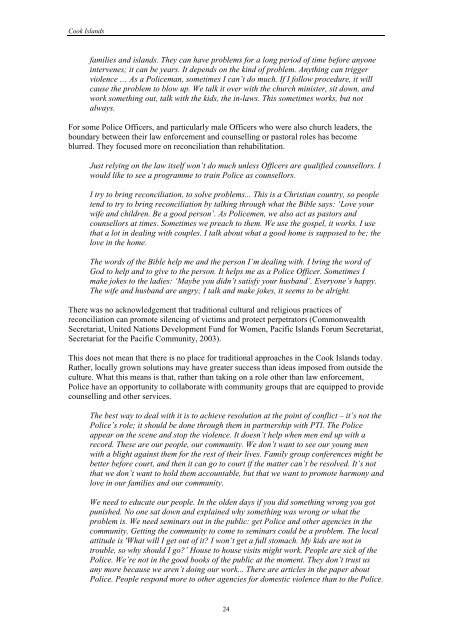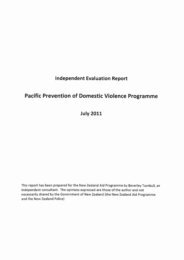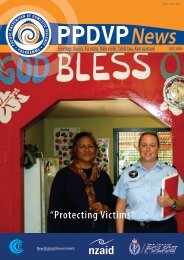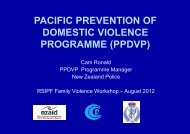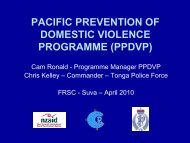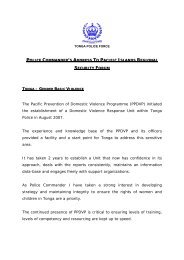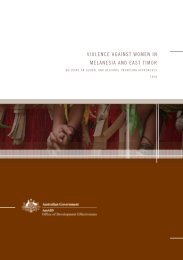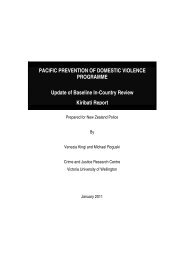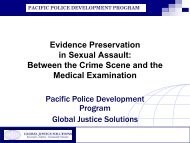Cook Islands - Pacific Prevention of Domestic Violence Programme
Cook Islands - Pacific Prevention of Domestic Violence Programme
Cook Islands - Pacific Prevention of Domestic Violence Programme
Create successful ePaper yourself
Turn your PDF publications into a flip-book with our unique Google optimized e-Paper software.
<strong>Cook</strong> <strong>Islands</strong><br />
families and islands. They can have problems for a long period <strong>of</strong> time before anyone<br />
intervenes; it can be years. It depends on the kind <strong>of</strong> problem. Anything can trigger<br />
violence … As a Policeman, sometimes I can’t do much. If I follow procedure, it will<br />
cause the problem to blow up. We talk it over with the church minister, sit down, and<br />
work something out, talk with the kids, the in-laws. This sometimes works, but not<br />
always.<br />
For some Police Officers, and particularly male Officers who were also church leaders, the<br />
boundary between their law enforcement and counselling or pastoral roles has become<br />
blurred. They focused more on reconciliation than rehabilitation.<br />
Just relying on the law itself won’t do much unless Officers are qualified counsellors. I<br />
would like to see a programme to train Police as counsellors.<br />
I try to bring reconciliation, to solve problems... This is a Christian country, so people<br />
tend to try to bring reconciliation by talking through what the Bible says: ‘Love your<br />
wife and children. Be a good person’. As Policemen, we also act as pastors and<br />
counsellors at times. Sometimes we preach to them. We use the gospel, it works. I use<br />
that a lot in dealing with couples. I talk about what a good home is supposed to be; the<br />
love in the home.<br />
The words <strong>of</strong> the Bible help me and the person I’m dealing with. I bring the word <strong>of</strong><br />
God to help and to give to the person. It helps me as a Police Officer. Sometimes I<br />
make jokes to the ladies: ‘Maybe you didn’t satisfy your husband’. Everyone’s happy.<br />
The wife and husband are angry; I talk and make jokes, it seems to be alright.<br />
There was no acknowledgement that traditional cultural and religious practices <strong>of</strong><br />
reconciliation can promote silencing <strong>of</strong> victims and protect perpetrators (Commonwealth<br />
Secretariat, United Nations Development Fund for Women, <strong>Pacific</strong> <strong>Islands</strong> Forum Secretariat,<br />
Secretariat for the <strong>Pacific</strong> Community, 2003).<br />
This does not mean that there is no place for traditional approaches in the <strong>Cook</strong> <strong>Islands</strong> today.<br />
Rather, locally grown solutions may have greater success than ideas imposed from outside the<br />
culture. What this means is that, rather than taking on a role other than law enforcement,<br />
Police have an opportunity to collaborate with community groups that are equipped to provide<br />
counselling and other services.<br />
The best way to deal with it is to achieve resolution at the point <strong>of</strong> conflict – it’s not the<br />
Police’s role; it should be done through them in partnership with PTI. The Police<br />
appear on the scene and stop the violence. It doesn’t help when men end up with a<br />
record. These are our people, our community. We don’t want to see our young men<br />
with a blight against them for the rest <strong>of</strong> their lives. Family group conferences might be<br />
better before court, and then it can go to court if the matter can’t be resolved. It’s not<br />
that we don’t want to hold them accountable, but that we want to promote harmony and<br />
love in our families and our community.<br />
We need to educate our people. In the olden days if you did something wrong you got<br />
punished. No one sat down and explained why something was wrong or what the<br />
problem is. We need seminars out in the public: get Police and other agencies in the<br />
community. Getting the community to come to seminars could be a problem. The local<br />
attitude is 'What will I get out <strong>of</strong> it? I won’t get a full stomach. My kids are not in<br />
trouble, so why should I go?’ House to house visits might work. People are sick <strong>of</strong> the<br />
Police. We’re not in the good books <strong>of</strong> the public at the moment. They don’t trust us<br />
any more because we aren’t doing our work... There are articles in the paper about<br />
Police. People respond more to other agencies for domestic violence than to the Police.<br />
24


